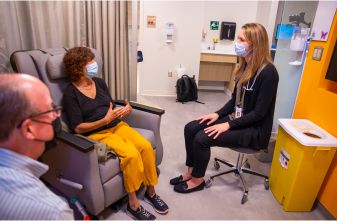Find info and support that works for you


Targeted therapy uses medicines designed to target specific features of cancer cells and stop them from growing and spreading. There is less risk of affecting healthy cells during this type of treatment. Many types of cancer can be treated by targeted therapy, however not all therapies work for everyone. Your cancer care team will work with you to decide if this is the right treatment for your cancer.
Common types of targeted therapies include immunotherapy and hormone therapy. You can read more about them below, or connect with your care team to ask questions and understand which ones might be right for to you.

Immunotherapy is a treatment that helps your immune system fight cancer. It can be used to treat many types of cancer. Several types of immunotherapy can be used to treat cancer. These types can be given in different ways such as by mouth (oral), topical (on the skin), through an intravenous (IV) line, or directly into the bladder through a catheter. Some side effects are fever, chills, muscle or joint pain, headache, fatigue (tiredness) and inflammatory reactions.

Hormone therapy (also called hormonal therapy, hormone treatment or endocrine therapy) is a treatment that slows or stops the growth of cancer that uses hormones to grow. This type of therapy is used to treat prostate and breast cancers.
Hormone therapy is commonly used along with other types of cancer treatments. This type of therapy can be given by mouth (oral), injection (shot) or through an intravenous (IV) line. The most common side effects are hot flashes and changes in bone density (or bone mass) that can leave your bones weak. These side effects will be watched closely during your treatment.
When you have treatment at one of our infusion centers, we’ll help you manage the stress, anxiety or nausea that can come from treatment with our comfort menu offerings.
A cancer diagnosis can be as scary for family and friends as it is for the person receiving the diagnosis, but there are lots of things your loved ones can do to support you.

Whenever possible, we support shared decision making in cancer treatment. We see patients as the experts in their own values and preferences, and providers as experts in evidence-based medical options.
Everyone’s body reacts differently to targeted therapy. You may have heard about common side effects such as nausea, fatigue or skin problems. It’s normal to feel anxious or uneasy about treatments. That’s why we’re committed to supporting you with the latest information—not only about side effects, but also about the steps you can take to manage or minimize them. We have deep experience helping people prepare for targeted therapy, and we will be with you each step of the way.
Contact your medical oncologist with any questions or concerns about side effects.


Clinical treatment is just one of the ways we provide expert care for people and families living with cancer. From money matters to holistic healing programs, our team is committed to serving you as a whole person—body, mind and spirit.

Patient account representatives can answer your questions about hospital bills or insurance coverage. They also can help you access Allina Health Financial Assistance Services.

A nurse navigator is a registered nurse who will support, educate and guide you through your course of treatment.

Registered dietitians can assess your food needs and help you set goals to improve eating and manage weight.
Talk with your cancer care provider about the variety of dietitian and nutrition services that are available.

Support groups are designed for people and families affected by cancer. These groups provide a place to connect with others and share thoughts, feelings and ask questions.

The Penny George Institute helps you improve your well-being by focusing on your whole being—mind, body and spirit.
Learn more about the Penny George® Institute for Health and Healing

Advance care planning is the process of giving information to others about your health care choices in case illness or injury prevents you from telling them yourself.

Palliative care is for anyone who is in any stage of an advanced illness. This is care that provides relief from the symptoms, pain and stress of a serious illness. The goal is to improve quality of life for both you and your family.

An oncology social worker is available to support you and your family during your treatment and recovery.
A cancer diagnosis can change your life in an instant. It’s natural to feel overwhelmed, confused or anxious about what to do next. That’s why we make it easy to find the information and resources you need at this difficult time.